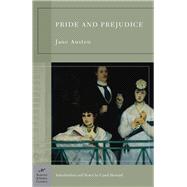What is included with this book?The New copy of this book will include any supplemental materials advertised. Please check the title of the book to determine if it should include any access cards, study guides, lab manuals, CDs, etc.
The Used, Rental and eBook copies of this book are not guaranteed to include any supplemental materials. Typically, only the book itself is included. This is true even if the title states it includes any access cards, study guides, lab manuals, CDs, etc.
From Carol Howard’s Introduction to Pride and Prejudice
It is sometimes said that Austen’s gift was to be a shrewd observer of her narrow, genteel social circle, that her experience and knowledge of the world were limited and her life sheltered, and that her novels realistically reflect the peaceful late-eighteenth- and early-nineteenth-century village community and English countryside she inhabited. That Austen was a careful observer of human motivation and social interaction is certainly true. One should not assume, though, that her choice to write novels of manners means that she was unaware of or unaffected by the political and social upheaval of her day. The idea that she centers her novels on the social classes with which she was most familiar is not entirely the case, although she had occasion to observe members of the gentry and aristocracy whose circumstances resembled those of some of the characters who populate her novels. Whether her own life was perfectly serene is questionable: Most lives, no matter how uneventful in retrospect, have their vicissitudes.
At the very least, Austen and her family must have had concerns over the tumultuous historical events that unsettled the British nation during their lifetime. She was born in 1775, the year that marked the beginning of the American Revolution. Several decades later, she would read newspaper accounts of another British conflict with the new American nation in the War of 1812, which began as she finished revising Pride and Prejudice. What must have played significantly in Austen’s imagination, as in the mind of every Briton, was the ongoing war with Napoleon’s forces, which marked the culmination of a century of conflicts between Britain and France, and which ended, with the Battle of Waterloo in June 1815, six months before her fortieth birthday. The British fear of invasion by Napoleon, which endured until 1805, caused concern even in the towns and villages that seemed safest. Austen would have been aware of the billeting of British militia troops in the English countryside, and she certainly followed the career of her brother Henry, who had joined the Oxford militia in 1793, when Britain’s latest war with France erupted in the aftermath of the French Revolution. She must also have taken a personal interest in the campaigns of the British navy, which counted her brothers Francis and Charles among its officers. To what extent she cared about daily political events is difficult to discern, for her letters are marked by characteristic irony. Of a newspaper report of an 1811 battle of the Peninsular War, when Napoleon invaded Spain and Portugal in an effort to close ports to British commerce, Austen declared, “How horrible it is to have so many people killed!—And what a blessing that one cares for none of them!” (Le Faye, Jane Austen’s Letters).
Excerpted from Pride and Prejudice by Jane Austen
All rights reserved by the original copyright owners. Excerpts are provided for display purposes only and may not be reproduced, reprinted or distributed without the written permission of the publisher.
